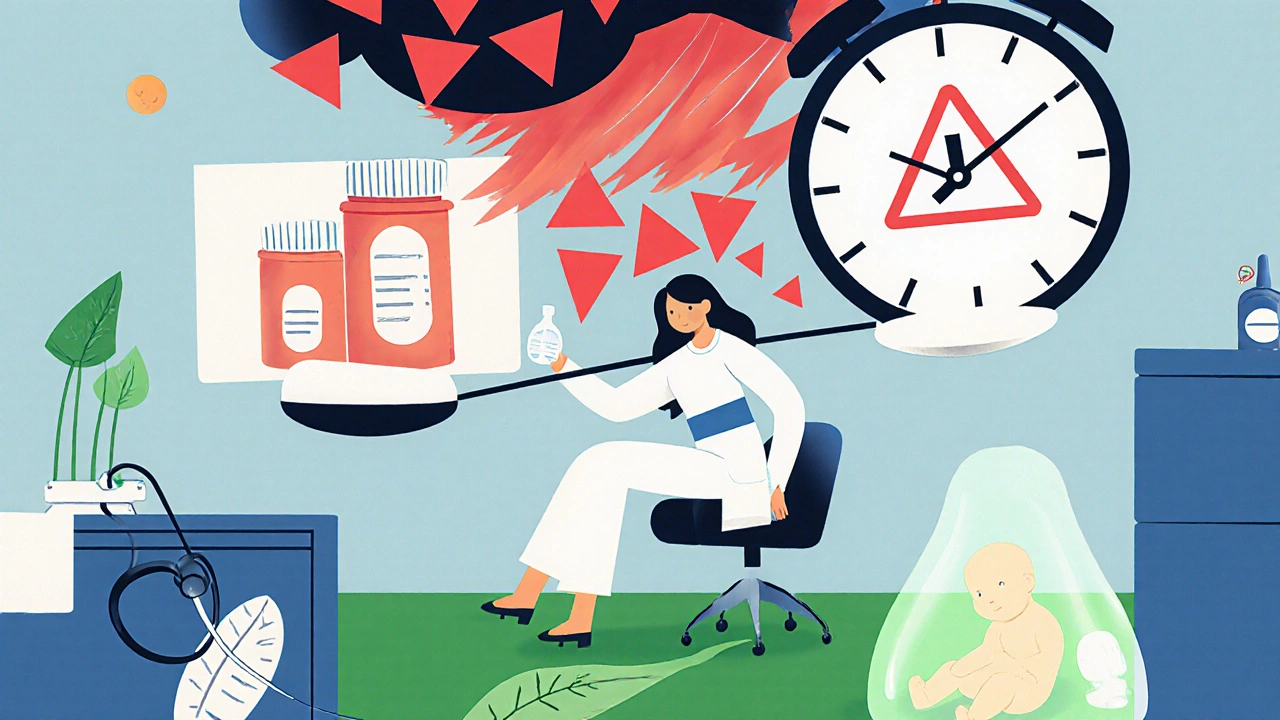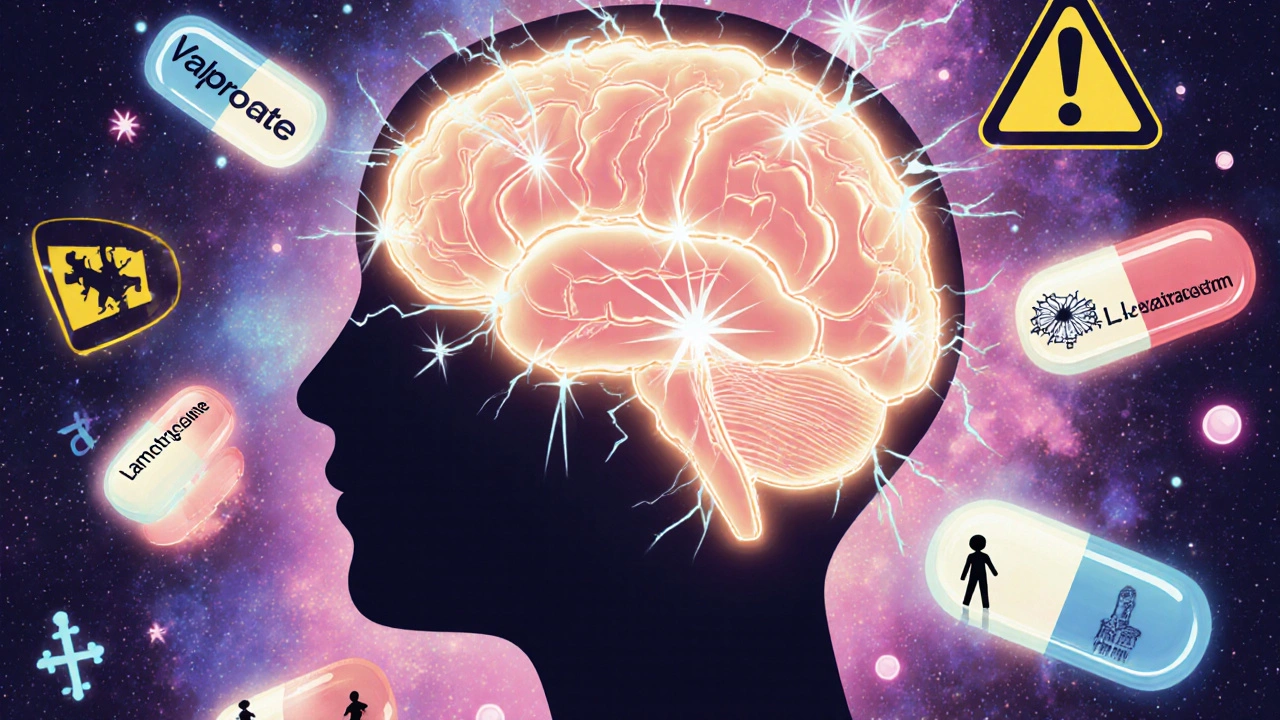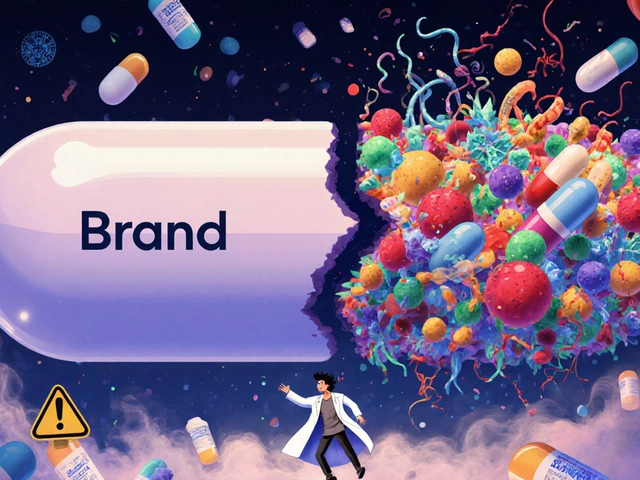When you're taking medication to control seizures, planning a pregnancy isn't just about getting pregnant-it’s about making sure both you and your baby stay safe. Many people don’t realize that some of the most effective seizure medications can increase the risk of birth defects or interfere with birth control. The truth is, seizure medications aren’t one-size-fits-all when it comes to pregnancy. Some are far safer than others, and knowing the difference can change everything.
Which Seizure Medications Carry the Highest Risks?
Not all antiseizure drugs are created equal when it comes to pregnancy. The biggest red flag is sodium valproate (valproic acid). Studies show that about 10% of babies exposed to this drug in the womb develop major physical birth defects-things like heart problems, cleft lip or palate, spinal cord issues, and microcephaly (a smaller-than-normal head size). The risk goes up with higher doses. That’s more than double the rate seen with other medications.
Other high-risk drugs include carbamazepine (Tegretol), phenytoin (Epanutin), phenobarbital, and topiramate (Topamax). These are linked to increased chances of heart defects, facial abnormalities, and slow fetal growth. The UK’s Medicines and Healthcare products Regulatory Agency (MHRA) has flagged these four specifically for their known teratogenic effects.
But here’s the important part: even with these risks, over 90% of babies born to women with epilepsy are healthy. That’s not luck-it’s because more doctors are now avoiding high-risk drugs and switching patients to safer options before pregnancy even begins.
The Safer Alternatives: Lamotrigine and Levetiracetam
If you’re planning a pregnancy, the best news is that two medications stand out as much safer: lamotrigine (Lamictal) and levetiracetam (Keppra). Research from the MHRA and multiple studies, including one from Stanford published in JAMA Neurology, show that babies exposed to these drugs in utero have similar development outcomes to babies whose mothers didn’t take any seizure medication at all.
One study tracked 298 children exposed to newer-generation ASMs and found no difference in verbal skills at age two. That’s huge. It means you can manage your seizures effectively without putting your baby at high risk.
These two drugs are now the first-line recommendation for women of childbearing age who need seizure control. They work well for many types of epilepsy, and when used at the right dose, they keep seizures under control without the same level of fetal risk.
How Drug Interactions Can Put You at Risk
Here’s something many people miss: seizure medications don’t just affect your baby-they can mess with your birth control. And vice versa.
Drugs like carbamazepine, phenytoin, phenobarbital, and high-dose topiramate can make hormonal birth control-pills, patches, rings-less effective. That means even if you’re taking your pill every day, you could still get pregnant without realizing it.
On the flip side, hormonal contraceptives can lower the levels of certain seizure medications in your blood. That’s especially true for lamotrigine, valproate, zonisamide, and rufinamide. If your lamotrigine level drops too low, you could start having seizures again.
This creates a dangerous loop: you take birth control to avoid pregnancy, but the medication makes the birth control fail-and if you do get pregnant, you might still be on a high-risk drug because your seizure control slipped. That’s why talking to your neurologist and gynecologist together is non-negotiable.

Why Uncontrolled Seizures Are Even More Dangerous
It’s easy to focus only on the risks of the drugs. But here’s the reality: having a tonic-clonic seizure during pregnancy is extremely dangerous. It can cause oxygen loss to the baby, trigger premature labor, lead to miscarriage, or result in serious injury to both you and your child.
Experts agree: no seizure medication is as dangerous as uncontrolled seizures. That’s why stopping your meds on your own is never the answer. The goal isn’t to avoid all medication-it’s to use the safest possible option at the lowest effective dose.
A 2020 study from Indiana University called this an “excruciating double bind.” You need the drug to survive, but the drug might harm your baby. That’s why planning ahead is everything.
Preconception Counseling Is Not Optional
If you’re a woman of childbearing age and you take seizure medication, you should have had a conversation with your doctor about pregnancy-even if you’re not planning to get pregnant right now. Why? Because half of all pregnancies are unplanned. And if you’re on valproate and get pregnant without knowing, the damage can start in the first few weeks-before you even miss a period.
Preconception counseling means reviewing your current meds, switching to safer alternatives if needed, adjusting your dose, and making sure your birth control is working properly. It also includes checking your blood levels of lamotrigine or other drugs if you’re using hormonal contraception.
Studies show that only about one-third of women with epilepsy get care that matches their reproductive goals. That’s not good enough. You deserve to plan your pregnancy safely.

The Big Picture: Things Are Getting Better
The good news? Things are improving. Between 1997 and 2011, the rate of major birth defects linked to seizure medications dropped by 39%. Why? Because doctors stopped prescribing valproate to women of childbearing age unless absolutely necessary. They started using lamotrigine and levetiracetam more often. They started testing drug levels before and during pregnancy.
But progress isn’t even. A French study found that women with lower income or less access to healthcare were more likely to still be on high-risk drugs during pregnancy. That’s a systemic issue-lack of access to specialists, long wait times, or not being offered safer alternatives.
And while we know a lot about the top six or seven drugs, there are still 11 others where we don’t have enough data to say they’re safe. That’s why ongoing research and reporting side effects matter.
What You Should Do Right Now
- If you’re on valproate and thinking about pregnancy-talk to your neurologist immediately. Don’t wait.
- If you’re on carbamazepine, phenytoin, phenobarbital, or topiramate, ask if you can switch to lamotrigine or levetiracetam.
- If you’re using hormonal birth control, ask your doctor if your seizure meds are making it less effective. You might need a higher-dose pill, an IUD, or another method.
- If you’re not on birth control and not planning pregnancy, make sure you’re using a reliable method. Don’t assume you’re safe.
- Keep your seizure diary. Track how often you have seizures and any side effects. That data helps your doctor adjust your treatment.
- Find a specialist who understands epilepsy and pregnancy. Not all neurologists do.
Having epilepsy doesn’t mean you can’t have a healthy baby. But it does mean you need to be proactive. The safest path isn’t about avoiding medication-it’s about choosing the right one, at the right dose, at the right time.
Can I stop my seizure medication if I get pregnant?
No. Stopping seizure medication without medical supervision can lead to uncontrolled seizures, which are far more dangerous to both you and your baby than the medications themselves. Always talk to your doctor before making any changes.
Is lamotrigine safe during pregnancy?
Yes. Lamotrigine is one of the safest antiseizure medications for pregnancy. Studies show no significant increase in birth defects or developmental delays in children exposed to it before birth. However, its levels drop during pregnancy, so your doctor may need to adjust your dose.
Do seizure medications affect fertility?
There’s no strong evidence that seizure medications reduce fertility. However, some drugs like valproate can affect hormone levels, which might impact ovulation. If you’re having trouble conceiving, talk to your doctor about your medication and possible alternatives.
Can I breastfeed while taking seizure medication?
Yes, most antiseizure medications are considered safe during breastfeeding. Lamotrigine and levetiracetam pass into breast milk in very small amounts and are generally well-tolerated by babies. Valproate is less ideal but can still be used with monitoring. Always check with your doctor.
How often should I get my blood levels checked during pregnancy?
If you’re taking lamotrigine, levetiracetam, or other drugs affected by pregnancy, your doctor will likely check your blood levels every 4 to 8 weeks. Hormonal changes during pregnancy can lower drug levels, increasing seizure risk. Regular monitoring helps keep you protected.
Are newer seizure medications safer than older ones?
Generally, yes. Medications developed after the 1990s-like lamotrigine, levetiracetam, and lacosamide-have better safety profiles during pregnancy than older drugs like valproate, phenytoin, and phenobarbital. But safety varies by individual, so your doctor will choose based on your seizure type and medical history.





Jessica Chambers
November 14, 2025 AT 23:55Wow. This is the kind of post that should be mandatory reading for every woman on AEDs. I was on valproate for years before I even knew it was risky during pregnancy. My neurologist never brought it up until I was 6 weeks pregnant with my second kid. Thank you for laying this out so clearly. 😔
Shyamal Spadoni
November 15, 2025 AT 15:14you know what they dont tell you? the pharma companies made these drugs for profit not for safety and now theyre pushing lamotrigine like its magic because it patents expired and they need new money streams. also why is it always women who have to adjust their meds? why dont men with epilepsy get the same scrutiny when they try to get their gf pregnant? this is gendered medical oppression bro. and also i think the moon affects seizure thresholds but no one talks about it.
Ogonna Igbo
November 16, 2025 AT 15:28Why do Americans always act like they invented medicine? In Nigeria we have traditional healers who cure epilepsy with herbs and spiritual cleansing. These drugs are poison from the West. My cousin stopped all meds and now he dances at weddings without seizures. Why do you trust chemicals over ancestral wisdom? This post is colonial brainwashing.
BABA SABKA
November 18, 2025 AT 05:24Let’s cut through the jargon: lamotrigine and levetiracetam are the new gold standard because they have the lowest teratogenic risk profile in the literature. The data from JAMA Neurology and MHRA is robust. But here’s the kicker-most primary care docs don’t know this. You need a neurologist who specializes in reproductive neurology. If you’re on topiramate or valproate and you’re not seeing one, you’re playing Russian roulette with your future kid’s neurodevelopment. This isn’t scare tactics-it’s pharmacokinetics.
Chris Bryan
November 18, 2025 AT 13:14So now we’re supposed to trust Big Pharma’s new ‘safe’ drugs? What’s next? They’ll say it’s fine to take antidepressants during pregnancy too. And who’s paying for all these blood tests? Medicaid won’t cover it. This is just another way to guilt poor women into expensive care while the rich get personalized medicine. The system is rigged. Always has been.
ASHISH TURAN
November 19, 2025 AT 06:53I’ve been on levetiracetam for 8 years and just got pregnant. My OB and neurologist coordinated my care and we adjusted my dose every 6 weeks. My son is 18 months old now-perfectly healthy, hitting all milestones. This isn’t theoretical. It works. Just don’t go it alone. Get the team.
Ryan Airey
November 21, 2025 AT 03:16Let’s be real: if you’re on valproate and didn’t get preconception counseling, you’re either negligent or your doctor is incompetent. There’s zero excuse in 2025. The guidelines have been out for a decade. Stop pretending this is complicated. It’s not. It’s negligence wrapped in medical jargon.
Hollis Hollywood
November 21, 2025 AT 19:21I just want to say how much this post means to someone like me who’s been scared to even think about having kids because of my epilepsy. I’ve been on lamotrigine for 5 years and I’ve always worried I’m a burden to any future child. Reading that over 90% of babies are healthy-really, truly healthy-gave me a little hope I didn’t know I was missing. Thank you for writing this. I’m going to schedule that counseling tomorrow.
Aidan McCord-Amasis
November 22, 2025 AT 11:38Just switch to levetiracetam. 💉 Done. 🚫 Valproate. 🚫 Topiramate. 🚫 Phenytoin. 💪 You got this.
Adam Dille
November 22, 2025 AT 22:51Big thanks to whoever wrote this. I’m a guy, but my girlfriend has epilepsy and I’ve been trying to learn everything I can. This is the clearest, most practical guide I’ve ever read. No fluff, no fearmongering. Just facts + action steps. We’re already talking to her neurologist next week. Also, I bought her a seizure tracker app. 🤝